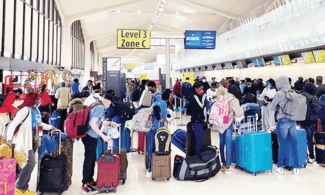
Saudi Arabia had already deported about 400 Nigerian women while as at September, 82 other Nigerians were in deportation facilities
Stranded Nigerian women in Saudi Arabia may not be repatriated until around next January, according to a source who is familiar with the activities of Nigerian diplomatic mission.
Saudi Arabia had already deported about 400 Nigerian women while as at September, 82 other Nigerians were in deportation facilities, the source said.

SaharaReporters gathered that the Nigerian embassy in Riyadh is taking care of 11 Nigerians while still awaiting directive from the Federal Ministry of Foreign Affairs to identify and provide support to other women in difficult circumstances in Saudi Arabia.
"These ladies are scattered all over and to process their matter, at least a staff of the embassy must be there in person. To travel to some parts of Saudi is more than 100,000 naira to go. Hotel, transportation, feeding etc. are not included. Before the matter of the ladies proper comes in," the source said.
Many of the women travelled to the country to work as domestic servants but lost their legal stay when they ran away from the abusive work, as the agencies that facilitated their travels usually seized their travel documents upon arrival.
The source said that the Nigerian diplomatic mission in the country could not help many of the women because there are "no funds for such – tracking and sheltering the runaways from Nigeria," he said.
"The ambassador got them accommodation. The cost of feeding them daily, hospital and other expenses cannot be underestimated, especially when no fund was budgeted for such in Nigeria."
SaharaReporters, however, learned that the embassy could source for funds if instructed to take action by Abuja.
"The Embassy must get exclusive clear instructions from Abuja before embarking on such a fund requiring endeavours," the source said.
One of the women who ran to the Nigerian embassy for help told SaharaReporters that she was turned away. Then she went to the International Organisation for Migration (IOM) which sheltered her.
"They were the ones providing food for us," she said. "They said they would organize a place for us to stay. This is where we found ourselves – Ministry of Labour in Riyadh, my friend and I."
She said, "so many people from different African countries have been here for more than eight months, I've been here for two months now. If the embassy helped me, I wouldn't be here now."
The repatriation of stranded Nigerians across Lebanon and Oman have gone more smoothly than in Saudi Arabia where the labour laws are more stringent.
The Saudi authorities would not allow those who have pending employment contracts to leave without some background checks.
Ferdinand Nwonye, the spokesperson for the Ministry of Foreign Affairs, said the Nigerian embassy in Riyadh could only do what was within its financial capacity.
"When you're talking about funds, you don't blame anybody. There is nothing they can do," Nwonye said. "You know the state of things here. They will be doing the only thing they can do, not what they can't do."